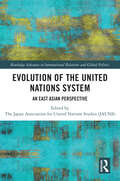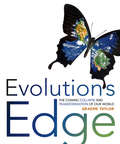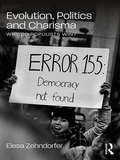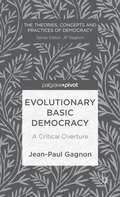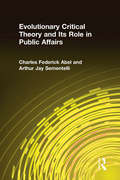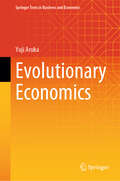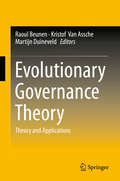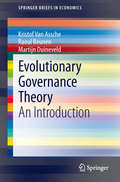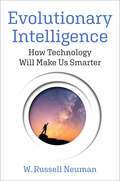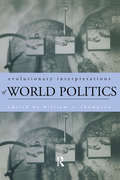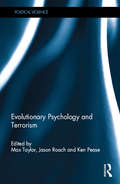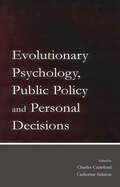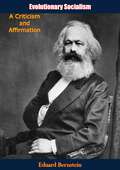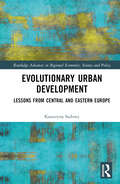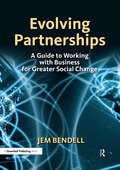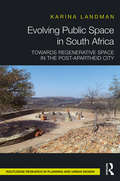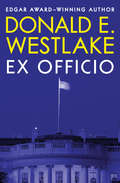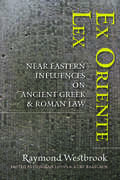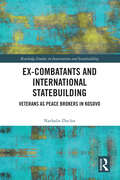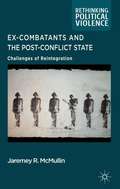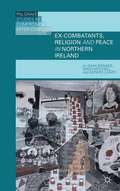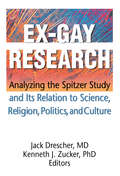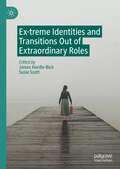- Table View
- List View
Evolution of the Social Contract
by Brian SkyrmsIn this pithy and highly readable book, Brian Skyrms, a recognised authority on game and decision theory, investigates traditional problems of the social contract in terms of evolutionary dynamics. Game theory is skilfully employed to offer new interpretations of a wide variety of social phenomena, including justice, mutual aid, commitment, convention and meaning. The author eschews any grand, unified theory. Rather, he presents the reader with tools drawn from evolutionary game theory for the purpose of analysing and coming to understand the social contract. The book is not technical and requires no special background knowledge. As such, it could be enjoyed by students and professionals in a wide range of disciplines: political science, philosophy, decision theory, economics and biology.
Evolution of the United Nations System: An East Asian Perspective (Routledge Advances in International Relations and Global Politics)
by JaunsContributors from Japan, Korea, and China explore the reaction of the United Nations to emerging global issues. A collaboration between the Japan Association for United Nations Studies with the Korea Academic Council on the United Nations System and the China Academic Net for United Nations Studies, this book presents a range of perspectives from both academics and practitioners. The areas explored and discussed include global governance, peace and security, global health governance, global citizenship, nuclear disarmament, and the Sustainable Development Goals. In particular and among other issues it addresses both the coordination of COVID-19 management and responses to Russia’s invasion of Ukraine. An invaluable, diverse, and concertedly non-Western approach to the challenges facing the UN.
Evolution's Edge: The Coming Collapse and Transformation of Our World
by Graeme TaylorThe coordinator of BEST Futures, a project researching sustainable solutions to global problems, advocates the need for a new evolutionary direction to address growing crises due to diminishing resources. In support of this transformation, he discusses the basis of a sustainable society; progress indicators that take into account emotional, intellectual, and spiritual needs; and tools for constructive change (e. g. , The Earth Charter, 2000). Color illustrations by Fereshteh M. Sadeghi enhance the text. Distributed by Consortium Books Sales and Distribution. Annotation ©2009 Book News, Inc. , Portland, OR (booknews. com)
Evolution, Politics and Charisma: Why do Populists Win?
by Elesa ZehndorferEvolution, Politics and Charisma: Why do Populists Win? shines compelling new light on the way in which the systematic targeting and manipulation of human physiology remain a cornerstone of all populist political campaigns. Readers wishing to make sense of the populist juggernauts of Trump and Brexit and of the cyclical and formulaic nature of the rise and fall of charismatic populism will find this book particularly appealing. Elesa Zehndorfer begins by presenting a highly applied explanation of the critical importance of political physiology, physiology theory, neuroscience and evolutionary biology in populist charismatic politics. She later eloquently explains how manipulation of physiological variables (such as heightened testosterone and dopamine) renders the political rally one of the most powerful weapons in a populist leaders’ campaign. Weber’s seminal conceptualisation of charisma ‘in statu nascendi’ and Hyman Minsky’s insightful theories of cyclical boom-and-bust scenarios are then juxtaposed alongside physiological theory to greatly amplify our understanding of the powerful biological antecedents of charismatic populism. These theoretical observations are then applied directly to recent high-profile populist campaigns – including the 2016 Trump Presidential campaign and early Presidency – and the Brexit referendum, to elucidating and compelling effect. Ultimately, Evolution, Politics and Charisma paints a clear evolutionary picture of the way in which politics is an emotional – not a rational – process, where our emotions are continually targeted to great, and strategic, effect, and where the most recent intersection of technology and physiology has driven the greatest surge in populism ever seen across the Western hemisphere since the 1930’s. Acknowledging this reality opens up exciting vistas in our understanding of the true power of charismatic populism and provides answers as to how its seductive and often dangerous power can be effectively resisted.
Evolutionary Basic Democracy: A Critical Overture
by Jean-Paul GagnonNo one in this world truly understands what democracy means. We operate democracy only through best guesses. This uncertainty has caused, and continues to cause, significant political troubles. This book offers a way forward. It provides a new tool that will allow us to understand democracy for the entire planet and all of humanity.
Evolutionary Critical Theory and Its Role in Public Affairs
by Charles Federick Abel Arthur Jay SementelliThis work addresses one of the most central and timely subjects in Public Administration - how to make sense of critical theory and especially how to assess its implications for everyday practice.
Evolutionary Economics (Springer Texts in Business and Economics)
by Yuji ArukaThis textbook presents a new way to visualize or imagine the evolutionary architecture of economics, to judge both its practical outcomes and its ultimate value. Evolutionary economics employs an Aristotelian architecture. The cognitive value of this imagination[H1] must be directly relevant to the evolutionary theory and practice of designing the architecture of the economic system. Mainstream economics completely ignores design value in order to concentrate on the ideal, Platonic vision of the economy. The current system is no longer one that converges on a constant entity, because the system is constantly evolving. The advent of the digital economy is an indispensable next step, and computational power and algorithmic rationality are increasingly dominating the economic system—and complicating it. In today’s society, neither fault nor malice matters in the algorithmic or human system. There is little room left for the effective working of human reason. Correspondingly, the meanings of money, exchange, the market system, auctions, production, consumption, and the currency transaction system are poised to change. In most cases, there will be digital counterparts. A smart contract tied together with DLT, for example, makes it possible to design an economically well-behaved peer-to-peer (P2P) system, which ranges from the micromarket to the international currency transaction system. The introduction of this technology and its architectural design may suggest what a truly decentralized future entails. This change may also bring about a new understanding of existing social consensus and practice. Thus, the implementation of these considerations naturally leads to a new style of chapter structuring in this book, from the classical analytical approach to exploring computational methods and digital tools: in many cases, the problems presented in each chapter are combined with discussions of a respective computational method and its practical value.
Evolutionary Governance Theory
by Raoul Beunen Martijn Duineveld Kristof Van AsscheThis volume presents empirical studies and theoretical reflections on Evolutionary Governance Theory (EGT), its most important concepts and their interrelations. As a novel theory of governance, EGT understands governance as radically evolutionary, which implies that all elements of governance are subject to evolution, that these elements co-evolve and that many of them are the product of governance itself. Through this book we learn how communities understand themselves and their environment and why they create the complex structures and processes we analyze as governance paths. Authors from different disciplines develop the EGT framework further and apply it to a wide rage networks of power, governance of agricultural resources etc. The contributors also reflect on the possibilities and limitations of steering, intervention, management and development in a world continuously in flux. It bridges the gap between more fundamental and philosophical accounts of the social sciences and applied studies, offering theoretical advancements as well as practical recommendations.
Evolutionary Governance Theory: An Introduction
by Raoul Beunen Martijn Duineveld Kristof Van AsscheThis short books offers the reader a remarkable new perspective on the way markets, laws and societies evolve together. It can be of use to anyone interested in development, market and public sector reform, public administration, politics & law. Based on a wide variety of case studies on three continents and a variety of conceptual sources, the authors develop a theory that clarifies the nature and functioning of dependencies that mark governance evolutions. This in turn delineates in an entirely new manner the spaces open for policy experiment. As such, it offers a new mapping of the middle ground between libertarianism and social engineering. Theoretically, the approach draws on a wide array of sources: institutional & development economics, systems theories, post-structuralism, actor- network theories, planning theory and legal studies.
Evolutionary Intelligence: How Technology Will Make Us Smarter
by W. Russell NeumanA surprising vision of how human intelligence will coevolve with digital technology and revolutionize how we think and behave.It is natural for us to fear artificial intelligence. But does Siri really want to kill us? Perhaps we are falling into the trap of projecting human traits onto the machines we might build. In Evolutionary Intelligence, Neuman offers a surprisingly positive vision in which computational intelligence compensates for the well-recognized limits of human judgment, improves decision making, and actually increases our agency. In artful, accessible, and adventurous prose, Neuman takes the reader on an exciting, fast-paced ride, all the while making a convincing case about a revolution in computationally augmented human intelligence.Neuman argues that, just as the wheel made us mobile and machines made us stronger, the migration of artificial intelligence from room-sized computers to laptops to our watches, smart glasses, and even smart contact lenses will transform day-to-day human decision making. If intelligence is the capacity to match means with ends, then augmented intelligence can offer the ability to adapt to changing environments as we face the ultimate challenge of long-term survival.Tapping into a global interest in technology&’s potential impacts on society, economics, and culture, Evolutionary Intelligence demonstrates that our future depends on our ability to computationally compensate for the limitations of a human cognitive system that has only recently graduated from hunting and gathering.
Evolutionary Interpretations of World Politics
by William R. ThompsonFirst Published in 2001. Routledge is an imprint of Taylor & Francis, an informa company.
Evolutionary Psychology and Terrorism (Political Violence)
by Ken Pease Jason Roach Max TaylorThis book explores the evolutionary context of terrorism and political violence. While evolutionary thinking has come to permeate both biological and social-science theorising, it has not yet been applied systematically to the areas of terrorism and political violence. This volume seeks to do this for the first time. It presents a collection of essays on evolutionary psychology and terrorism, which encourage the reader to approach terrorism from a non-traditional perspective, by developing new approaches to understanding it and those who commit such acts of violence. The book identifies evolutionary thought as heuristically important in the understanding of terrorism, explores the key conceptual themes, and provides an evolutionary (and cross-species) understanding of the community-wide effects of terrorist attacks. The contributors bring forward innovative ideas and concepts to assist the practitioner, analyst and academic to better understand and respond to the threat of terrorism. In doing so this book challenges existing assumptions about terrorism and those who carry out such acts, in order to move the debate into new areas characterized by an emphasis on intellectual quality and rigour, an interdisciplinary approach, and a drawing together of theory and practice. The intention is to provide a sufficient discussion to enable the reader to both understand the relevance of evolutionary thinking to terrorism and political violence, and to appreciate the practical implications of conceptualising problems in this way. This book will be of much interest to students of terrorism and political violence, psychology, criminology and security studies.
Evolutionary Psychology, Public Policy and Personal Decisions
by Charles Crawford Catherine SalmonDuring the last 15 years, human sociobiology has metamorphosed into evolutionary psychology. It is concerned with the social problems and stresses hominid and primate ancestors encountered, the psychological mechanisms natural selection shaped to deal with these stresses, and the way those ancient mechanisms work now. Evolutionary psychologists are making great progress in expanding the understanding of human nature, however, this knowledge has had little impact on policymakers and legislators. Supreme Court justices and managers seldom consult evolutionary psychologists to help with their deliberations. When faced with private decisions few individuals ask themselves how a Darwinian perspective might help them. This volume's aim is to start the process of using theory and findings of evolutionary psychology to help make the world a better place to live. This book takes evolutionary psychology explicitly into applied areas in a way no other book has. It includes a reasonable scope of applications from pornography to psychopaths and from morality to sex differences in the workplace. An applications section provides concrete ideas for dealing with social and policy issues, including chapters on women in the workplace, rape, and child support. Providing good coverage of basic issues and theory of the field, this book gives lay people and law/policymakers appropriate background to fully understand the applications chapters. Part II provides information on basic psychological mechanisms for group living--including chapters on emotions, reciprocity and legal reasoning, and self deception--that impact on how well public policy and law function. The material in the first two sections provide an intellectual basis for the chapters in the third part of the book which deals with the application of evolutionary psychology to a variety of substantive areas related to public policy and personal decisions. A political scientist concludes the book with a commentary on evolutionary psychology and public policy. The book is designed to serve as a stand-alone text in evolutionary psychology and public policy that can be used in a variety of disciplines, such as psychology, social work, law and psychology, and public policy.
Evolutionary Socialism: A Criticism And Affirmation
by Eduard BernsteinEduard Bernstein, a German politician of the socialist party, sets out his beliefs in peaceful, incremental legislative transition to a socialist planned economy.Writing in 1899, the mature Bernstein had by this time disavowed the earlier doctrines of Marxism which crucially advocated violence in the form of revolutionary upheaval. Across three chapters, he details the practical steps a given nation can take to instilling socialism via peaceful means. Quoting Marx’s later works, as well as the words of Friedrich Engels, Bernstein develops an alternative thesis that goes against the grain of early Communist thought.Bernstein discusses how a society can realign its industry, production and workers toward achieving a purely socialist-communist outcome. Under no illusions about the stark differences between a capitalist, free market economy and a planned, socialist one, the author details how and in what order the incremental changes towards socialism should be implemented. The redistribution of incomes in a manner that is gradually more equitable to the proletariat is depicted in a series of charts.The stark revolutionary upheavals which underpinned the establishment of socialist and communist governments in the 20th century were in contrast to Bernstein’s visions of socialism achieved by democratic and peaceful means. Despite such developments, Bernstein remained an adherent of peace and non-violence in politics until he perished in his native Germany in 1932.-Print ed.
Evolutionary Urban Development: Lessons from Central and Eastern Europe (Routledge Advances in Regional Economics, Science and Policy)
by Katarzyna SadowyDrawing on a range of disciplinary approaches, this monograph explores the drivers of urban development. Through an evolutionary lens, cities are shown to find a development path amidst an ever-changing landscape, sometimes facing extreme externalities such as wars and economic crises. Key themes covered include urban growth, decentralization, path dependence, institutional change, governance, entrepreneurship and culture. Detailed case studies of the history-rich metropolises of Berlin, Budapest and Warsaw allow the author to examine the adaptive abilities of cities in flux, and draw conclusions with broader international relevance. This monograph will be valuable reading for advanced students and researchers in urban economics, evolutionary economics, institutional economics and Central European studies.
Evolving Partnerships: A Guide to Working with Business for Greater Social Change
by Jem BendellBy bringing together their respective competencies and resources for the greater good, governments, business, civil society and multilateral agencies have been seeking innovative ways to work together to respond to the myriad global challenges of our time: the impact of climate change; human security; the prevention, care and treatment of HIV/AIDS and other major diseases; the generation of new investment, entrepreneurship and employment; and financing for development. The appetite for such partnerships appears strong. Over 90% of corporate executives responding to a World Economic Forum survey felt that future partnerships between business, government and civil society would play either a major role or some role in addressing key development challenges. This trend will only be increased by the Western financial crisis and the retreat of the state from many areas of societal concern. In the last 15 years, many new partnerships have been formed, and many new people exposed to partnership ways of working. There have been remarkable successes, but also a range of concerns about effectiveness and accountability. Partnerships can work, but can they work better? Many practitioners are now asking how they can achieve a greater scale of impact to match the magnitude of the social and environmental challenges we face. When considering how to equip their organization or programme with the necessary skills to engage with companies in new ways, many leaders of NGOs or UN agencies hire staff from the private sector. Although such staff exchanges are important, it is not sufficient to rely on private-sector staff to develop and implement strategic forms of engagement. Rather, engaging business for social change is a specialism in itself. This book seeks to distil some of the author's 15 years of experience and key learnings on the advanced strategic planning of partnerships for people who work within civil society or public-sector organizations and who already partner with companies. Much of the research focus to date has been on operational issues, rather than on the strategic challenge of evolving partnerships to achieve a greater scale of impact. Rather than helping the reader with moving on from partnerships, this guidebook is intended to help with moving up to a greater scale of impact. The author identifies three generations in the evolution of cross-sector partnering and draws insights from the latest biological evolutionary theory on how complex systems can sustain themselves over time, translating this into a method for understanding and assessing partnering practice. Evolving Partnerships provides a rich and accessible mix of commentary, boxes for clarification, and 11 exercises to help the reader evolve partnering to achieve a wider level of impact – a level that responds to the scale, depth and urgency of the challenges we face today. Written by one of the world's leading authorities on partnerships and a key architect of global partnerships, including the Marine Stewardship Council, Evolving Partnerships will be essential reading for all those involved in cross-sectoral partnerships.
Evolving Public Space in South Africa: Towards Regenerative Space in the Post-Apartheid City
by Karina LandmanEvolving Public Space in South Africa discusses the transformation of public space highlighted in the country. Drawing on examples from major cities, the author demonstrates that these spaces are not only becoming wasted space, but are also adapting and evolving to accommodate new users and uses in various parts of the city. This process of evolution tends to challenge the more traditional visions and general global views of declining public space in cities and argues that it rather resembles the resilience of these spaces and the potential for regeneration through continuously emerging and mutating forms, functions and meanings. Including over 20 black-and-white images, this book would be beneficial to academics and students of urban planning and design and those interested in the regeneration of cities.
Ex Officio
by Donald E. WestlakeAn ailing ex-president attempts to return to the world stageFew retirements are tougher than that of a former president. For more than a decade, the once-powerful Bradford Lockridge, whose presidency was cut short after one term, has slipped further and further into obscurity. At his lowest point, he flies to California to attend the opening of a supermarket, just for a chance to get some sunshine. After the ceremony ends, Lockridge faints, waking up after a few minutes, confused and stuttering. The ex-president is beginning to die.Before he goes, he wants one last chance to change the world. An arms race is developing with Communist China, and Lockridge had more success than any other president in dealing with the Reds. The world has passed him by, but this ex-president still wants to save it—even if it means risking his own life.
Ex Oriente Lex: Near Eastern Influences on Ancient Greek and Roman Law
by Raymond WestbrookAn essential collection of Raymond Westbrook’s groundbreaking work on the cross-cultural history of ancient law.Throughout the twelve essays that appear in Ex Oriente Lex, Raymond Westbrook convincingly argues that the influence of Mesopotamian legal traditions and thought did not stop at the shores of the Mediterranean, but rather had a profound impact on the early laws and legal developments of Greece and Rome as well. He presents readers with tantalizing fragments of early Greek or archaic Roman law which, when placed in the context of the broader Near Eastern tradition, suddenly acquire unexpected new meanings.Before his untimely death in July 2009, Westbrook was regarded as one of the world’s leading authorities on ancient legal history. Although his main field was ancient Near Eastern law, he also made important contributions to the study of early Greek and Roman law. In his examination of the relationship between ancient Near Eastern and pre-classical Greek and Roman law, Westbrook sought to demonstrate that the connection between the two legal spheres was not merely theoretical but also concrete. The Near Eastern legal heritage had practical consequences that help us understand puzzling individual cases in the Greek and Roman traditions. His essays provide rich material for further reflection and interdisciplinary discussion about compelling similarities between legal cultures and the continuity of legal traditions over several millennia.Aimed at classicists and ancient historians, as well as biblicists, Egyptologists, Assyriologists, and legal historians, this volume gathers many of Westbrook’s most important essays on the legal aspects of Near Eastern cultural influences on the Greco-Roman world, including one new, never-before-published piece. A preface by editors Deborah Lyons and Kurt Raaflaub details the importance of Westbrook’s work for the field of classics, while Sophie Démare-Lafont’s incisive introduction places Westbrook’s ideas within the wider context of ancient law.
Ex-Combatants and International Statebuilding: Veterans as Peace Brokers in Kosovo (Routledge Studies in Intervention and Statebuilding)
by Nathalie DuclosThis book examines the international efforts to regulate violence in Kosovo since 1999 through the United Nations Mission in Kosovo (UNMIK) and covers 15 years of international presence.The book analyses the process of implementing international policies from a sociological perspective, and looks at the adaptations and arrangements of public policies achieved through the transactions of international actors with local actors, who are at the heart of policy implementation. In particular, it analyses the disarmament, demobilisation, and reintegration of combatants (DDR) programme and shows the extent to which it was co-produced with Kosovo Liberation Army (KLA) leaders co-opted by international administrators. These analyses take the opposite view to the work that considers ex-combatants as spoilers. In Kosovo, the combatant leaders acted as peace brokers, facilitating demobilisation and exercising disciplinary control over rank-and-file combatants. Their position as brokers helped them to take control of the new state being built under international administration. This book shows the importance of the relationship between ex-combatants and the state and illustrates the multiplicity of their possible trajectories, including political ones. To elucidate the dynamics of co-production in shaping DDR policies and hybridising international policies as well as in state formation, the book relies on around a hundred interviews with ex-combatants of the KLA and with international personnel, as well as on the archives of international organisations and observations in the field.This book will be of much interest to students of international statebuilding, peace and conflict studies, Balkan politics and international relations.
Ex-Combatants and the Post-Conflict State
by Jaremey R. McmullinThis book provides a critical analysis of the reintegration challenges facing ex-combatants. Based on extensive field research, it includes detailed case studies of ex-combatant reintegration in Namibia, Mozambique, Sierra Leone, and Liberia.
Ex-Combatants, Religion, and Peace in Northern Ireland
by David Mitchell John D. Brewer Gerard LeaveyStudies of Northern Ireland's ex-combatants ignore religion, while advocates of religious interventions in transitional justice exaggerate its influence. Using interview data with ex-combatants, this book explores religious influences upon violence and peace, and develops a model for evaluating the role of religion in transitional justice.
Ex-Combatants’ Voices: Transitioning from War to Peace in Northern Ireland, South Africa and Sri Lanka (Palgrave Studies in Compromise after Conflict)
by John D. Brewer Azrini WahidinThis book develops the discourse on the experiences of ex-combatants and their transition from war to peace, from the perspective of scholars across disciplines. Ex-combatants are often overlooked and ignored in the post-conflict search for memory and understanding, resulting in their voice being excluded or distorted. This collection seeks to disclose something of the lived experience of ex-combatants who have made the transition from war to peace to help to understand some of the difficulties they have encountered in social and emotional reintegration in the wake of combat. These include: motivations and mobilizations to participation in military struggle; the material difficulties experienced in social reintegration after the war; the emotional legacies of conflict; the discourses they utilize to reconcile their past in a society moving forward from conflict toward peace; and ex-combatants’ subsequent engagement – or not – in peacebuilding. It also examines the contributions that former combatants have made to post-conflict compromise, reconciliation and peacebuilding. It focusses on male non-state actors, women, child soldiers and, unusually, state veterans, and complements previous volumes which captured the voices of victims in Northern Ireland, South Africa and Sri Lanka. This volume speaks to those working in the areas of sociology, criminology, security studies, politics, and international relations, and professionals working in social justice and human rights NGOs.
Ex-Gay Research: Analyzing the Spitzer Study and Its Relation to Science, Religion, Politics, and Culture
by Jack Drescher Kenneth J ZuckerDefenders and critics of the controversial Spitzer study analyze its methodologies and findingsIn 2001, Robert L. Spitzer, MD, presented his study on sexual conversion therapy with its controversial findings that some homosexuals can change their sexual orientation. The resulting media sensation and political firestorm enraged the study&’s critics and emboldened its supporters. Ex-Gay Research: Analyzing the Spitzer Study and Its Relation to Science, Religion, Politics, and Culture presents leading experts examining Spitzer&’s research methodology and findings to discern whether the study itself deserves deeper consideration or outright dismissal. Every facet of the study is reviewed to discuss the positive or negative aspects of the results, its significance in political and social terms, and the implications for the future. Dr. Spitzer himself was an instrumental figure in the American Psychiatric Association's decision in 1973 to remove homosexuality as a mental illness listing from the Diagnostic and Statistical Manual-III. His later study that states that in some individuals, homosexuality may be more fluid than previously thought stirred controversy in the psychiatric community and society at large. His study is presented here to allow the reader to evaluate and consider it for themselves. Leading experts then voice their own pro or con views on the methodology and findings. Ex-Gay Research: Analyzing the Spitzer Study and Its Relation to Science, Religion, Politics, and Culture fearlessly illustrates the sometimes fuzzy boundary between science and politics, courageously spotlighting the culture wars now dividing our society.Ex-Gay Research: Analyzing the Spitzer Study and Its Relation to Science, Religion, Politics, and Culture discusses: the ex-gay movement the nature of scientific inquiry the relationship between science and politics the results of sexual conversion therapies gay and lesbian rightsEx-Gay Research: Analyzing the Spitzer Study and Its Relation to Science, Religion, Politics, and Culture is essential reading for sex researchers, mental health professionals, pastoral counselors, political activists, and any person asking if one can truly "change" his or her homosexuality.
Ex-treme Identities and Transitions Out of Extraordinary Roles
by Susie Scott James Hardie-BickThis book focuses on the experience of leaving unusual or extreme situations: from military careers to religious communities, subcultures, criminal groups and political leadership. It explores how people become disillusioned with and disengaged from these social worlds, challenging their sense of self-identity and cultural belonging. Each chapter considers how participants negotiate the process of ‘role exit’ and adjust to their new identity back in the everyday world. Drawing on symbolic interactionist and existentialist theories, the authors discuss how ex-members dismantle and rebuild their lives in a search for personal meaning.

